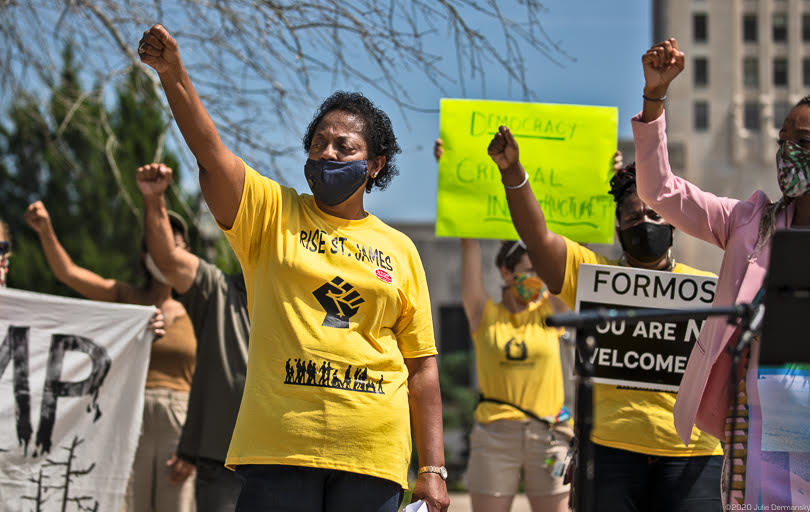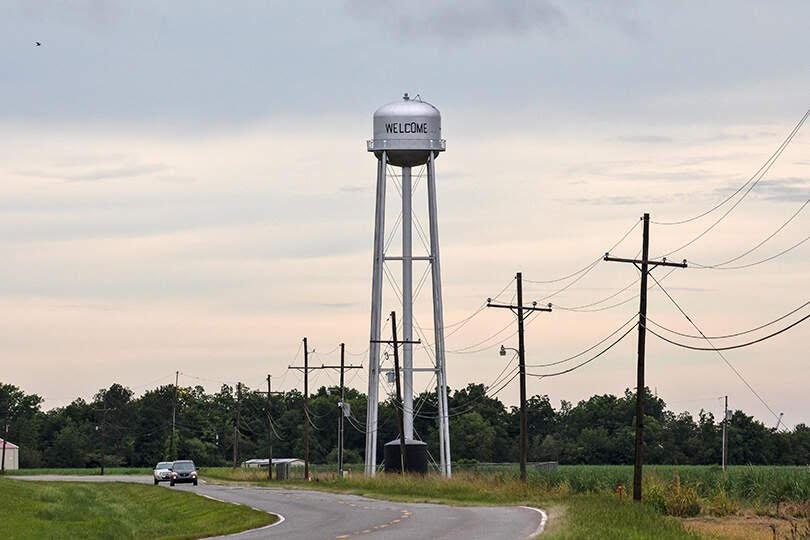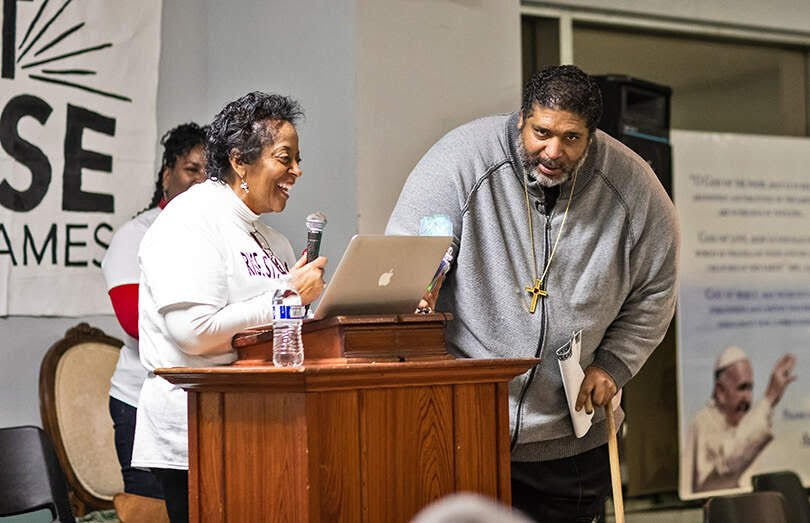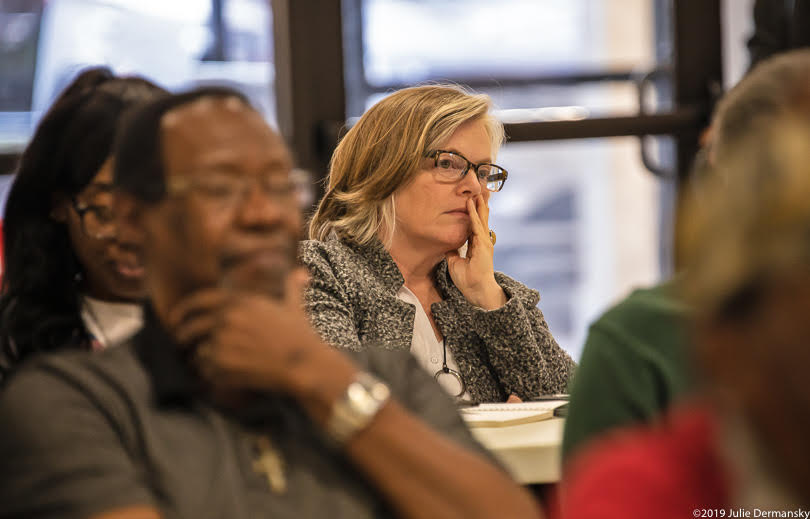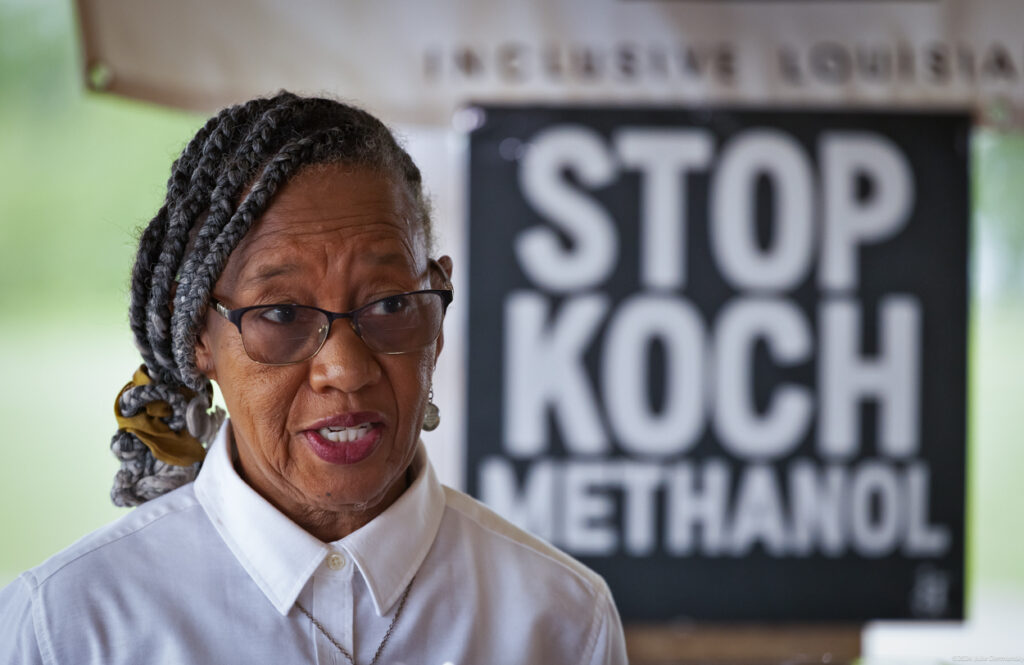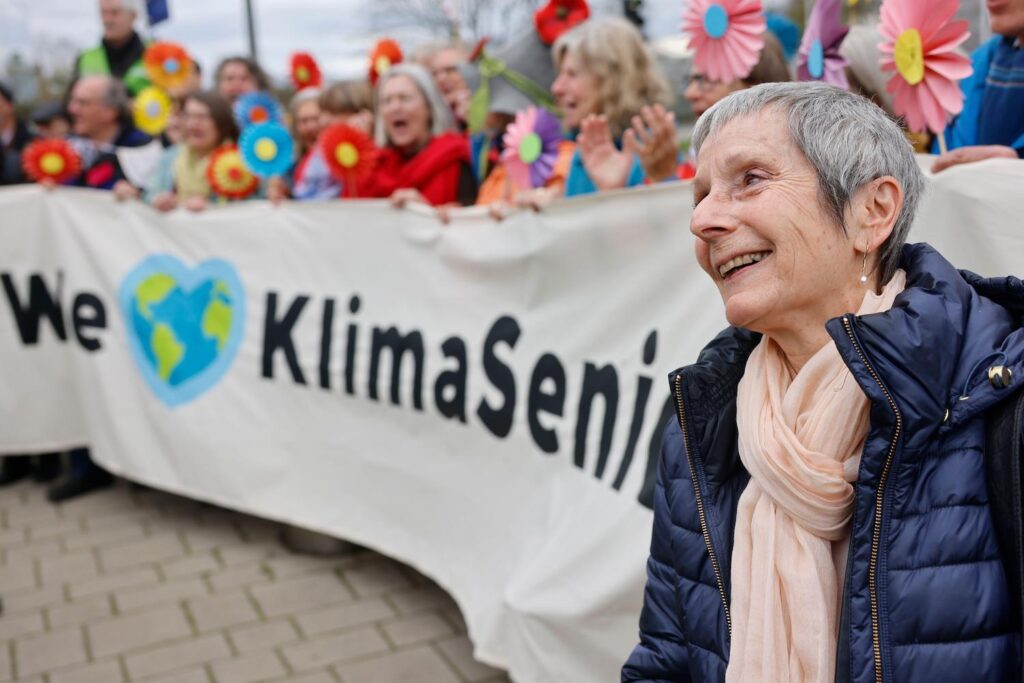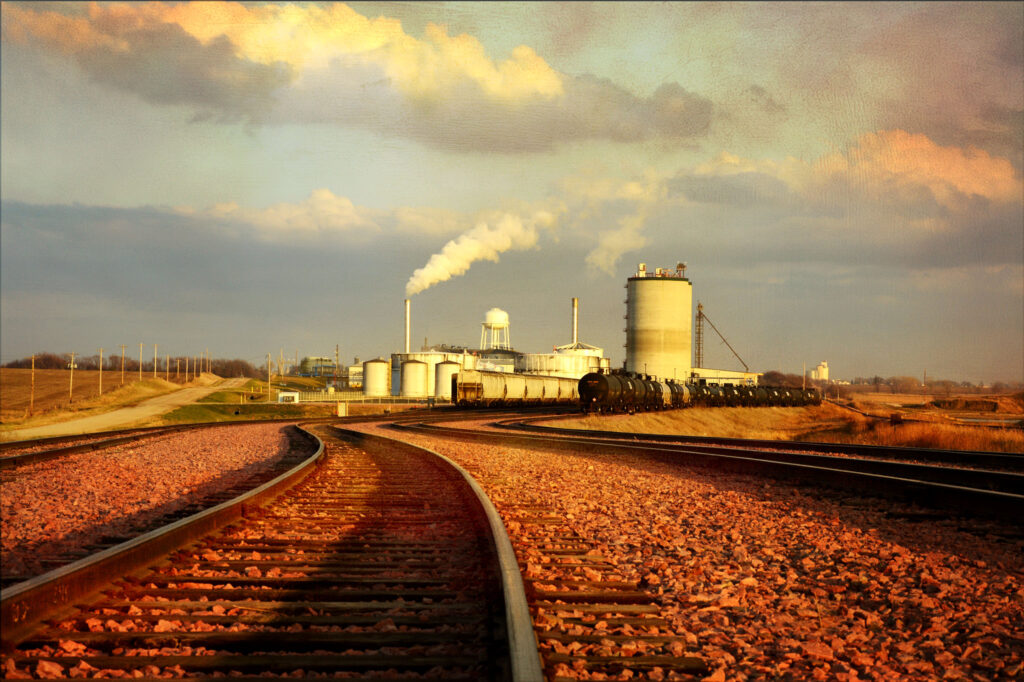On Friday, June 12, Louisiana’s Democratic governor John Bel Edwards is expected to sign off on a piece of legislation, House Bill 197, that would make it a more serious crime to trespass on Louisiana’s so-called “critical infrastructure,” including the state’s system of flood-control levees, fossil fuel pipelines, and sprawling network of petrochemical plants and refineries.
But if you ask Sharon Lavigne, founder of RISE St. James, a Louisiana community group, what House Bill 197 means to her, the answer that comes back isn’t about floodgates or water pumps or pipelines. It’s about the legacy of slavery in the United States — and how that legacy echoes in criminalization efforts today.
“It means that I cannot go and visit the gravesites,” Lavigne told DeSmog on Wednesday, June 10, referring to recently discovered slave cemeteries on former plantations now owned by petrochemical giant Formosa. The Taiwanese company plans to build a massive plastics manufacturing site in St. James Parish where Lavigne lives. “I have to go on the property to go to the gravesite. That affects me because my ancestors are in that grave.”
House Bill 197, which was approved by the state’s legislature and is slated for the governor to sign or veto by Friday, would transform some types of trespassing — generally a low-level violation that leads to a small fine — into a felony carrying a minimum sentence of between three and 15 years. And because that sentence would be a mandatory minimum, a judge would have no legal discretion to lower the penalty for anyone convicted under that law, even in the face of compelling extenuating circumstances.
UPDATE, June 12, 2020: On Friday, June 12, Gov. John Bel Edwards vetoed House Bill 197. “Victory is Ours!,” the Coalition Against Death Alley wrote on Twitter after the veto was announced.
For years, mandatory minimum sentencing, particularly in the context of the “war on drugs,” has been faulted for contributing to the racial disparities in U.S. policing and prisons. “Mandatory sentencing laws disproportionately affect people of color and, because of their severity, destroy families,” a Families Against Mandatory Minimums primer explains. A 2013 Yale Law Journal study found that prosecutors were twice as likely to charge Black defendants under statutes carrying mandatory minimum penalties as white defendants who committed similar crimes.
The battle over House Bill 197 and more broadly, the Formosa plastic plant’s construction, touches not only on the legacy of enslavement in the United States, but also on environmental racism, the fossil fuel industry, and how impacted communities are policed and criminalized today. For foreign investors watching events play out, the battle also offers insight into risks associated with the petrochemical projects in the U.S., particularly given the petrochemical industry’s history of pollution both on the Gulf Coast and worldwide.
“The facility would mean the destruction of 5th District communities, including Freetown, founded by enslaved people who fought for and won their emancipation,” environmental groups Earthworks, RISE St. James, and the Louisiana Bucket Brigade wrote in a statement. “With annual proposed greenhouse gas emissions of 13 million tons, Formosa Plastics would be the largest new source of greenhouse gases in the nation.”
Sharon Lavigne speaking at a June 10 press conference in front of the State Capitol building in Baton Rouge, Louisiana. She asked the Governor to veto HB 197. Credit: Julie Dermansky ©2020
‘Death Alley’
Sharon Lavigne was born and raised in a part of Louisiana known for decades as Cancer Alley — or, as some activists have more recently dubbed it, Death Alley. St. James Parish, already part of Cancer Alley, could see its toxic air pollution more than double if the Formosa plant is built. Four out of five residents living within a one-mile radius of Formosa’s site are African American. Nearby St. John the Baptist Parish, also in Cancer Alley and where 58 percent of residents are African American, had the highest per-capita COVID-19 death rate in the U.S. for a period in April, with experts pointing to petrochemical pollution that left many in the region with weakened health going into the pandemic.
Lavigne’s house is just a few miles from a site where Formosa Plastics is planning one of the largest new petrochemical projects in the U.S., involving 10 chemical plants and 14 separate major facilities, where raw materials for plastics, ethylene and propylene, would be made. Builders predict that the project could create thousands of construction jobs and an additional 1,200 permanent jobs if the project is completed.
The roughly 2,500 acres of land bought up by Formosa for its $9.4 billion petrochemical project — which the company dubbed the “Sunshine Project” presumably after the nearby Sunshine Bridge — included multiple former plantation sites, as is common for petrochemical projects in the region.
“The vast majority of the industrial facilities in ‘Cancer Alley’ are on the grounds of former plantations,” researcher Justin Kray told The Intercept’s Sharon Lerner in December 2019. “The areas where large petrochemical companies want to locate are large, undivided tracts of land. And these are the undivided tracts.”
A water tower in Welcome, Louisiana, near the site of Formosa’s planned plastics and petrochemical complex. Credit: Julie Dermansky ©2020
During the 1800s, hundreds of Black people had been enslaved on those plantations, most of which grew sugar, records show, and an unknown number of people died while enslaved on that land. In July 2018, an archaeologist with Coastal Environments, Inc. reached out to Formosa, notifying the company that maps, dating back to 1877 and 1878, had newly become available and suggested that the land where Formosa planned to build should be re-surveyed for slave cemeteries.
On December 23, 2019, attorneys for RISE St. James sought to revoke local land permits for Formosa revoked, citing new evidence that gravesites of enslaved people had been found on the site and alleging that Formosa had failed to notify local officials about the gravesites while the permits had been pending.
The Intercept reported that Formosa’s law firm had been aware of one of the graves and suggested fencing it off to prevent disturbance, adding that this “would mean that portions of the planned Utilities Plant may have to be relocated, which makes this a very difficult option” for Formosa.
A March report by Coastal Environments found that Formosa’s surveys had not only missed one of the two graveyards, but also five more potential slave cemeteries on the property.
Formosa, Coastal Environments reported, had repeatedly searched in the wrong places for graveyards where enslaved people had been buried. “Formosa’s own documents show they repeatedly failed to search the most likely location for graves associated with the Acadia Plantation Cemetery,” attorneys for RISE St. James wrote in March.
“The slave plantations [in St. James Parish] were some of the worst plantations in the world,” Rev. William Barber II of the Poor People’s Campaign, told NOLA.com last year after the slave graveyards on Formosa’s site were first discovered. And he expressed concern about plans to use more of the parish for petrochemical manufacturing.
Lavigne with Rev. William Barber II in St. James Parish on January 12, 2019. Credit: Julie Dermansky ©2019
“The land that once destroyed people’s lives, psychologically and physically,” Rev. Barber added, “is now being used to destroy people’s lives through toxins and pollution.”
Formosa did not immediately respond to a request for comment.
‘It’s Intimidation’
Formosa broke ground on the petrochemical project in late March, surprising project opponents by moving forward with construction during the COVID-19 pandemic and before legal disputes over the graveyards were settled.
Meanwhile, in the state’s capitol, lawmakers are on the cusp of turning House Bill 197 into law. Described by its sponsor as an effort to address trespassing on levees during storms, the bill — which moved through the state’s legislature in just nine days — has been criticized as hastily approved — and could carry extraordinary consequences for civil rights.
Lavigne and her legal counsel fear the bill would make it extremely dangerous to go visit the graves of people who were enslaved in St. James Parish, where Lavigne traces her roots back multiple generations.
RISE St. James has previously asserted that its legal right to visit the graveyard is clear, regardless of HB197. “Louisiana law is clear that when cemeteries or burial grounds are discovered on private property, the landowner may not prevent access to those sites by descendants or friends,” Pamela C. Spees, an attorney with the Center for Constitutional Rights, wrote to Formosa’s attorneys at the law firm Jones Walker, requesting that Lavigne and RISE St. James be allowed to visit the cemetery on Juneteenth, the June 19 holiday memorializing the end of slavery in the U.S.
“These are challenging and painful times as the country reels from the effects of our collective failure to truly reckon with the traumatic history of slavery and its aftermath and modern vestiges in the form of systemic oppression, violence, and inequalities faced by Black people,” Spees wrote in a June 5 follow-up letter, noting that the company had yet to respond to RISE St. James’ request for a Juneteenth visit.
Pamela Spees at a RISE St. James revival event in Convent, Louisiana, on March 21, 2019. Credit: Julie Dermansky ©2019
At yesterday’s event, civil liberties advocates called on the governor to reject House Bill 197. “Putting peaceful demonstrators at risk of extreme punishment at the very time that this country is rising up against police brutality and state terror against Black communities is a crime, sir,” Alanah Odoms Herbert, executive director of the ACLU of Louisiana, said. The ACLU is circulating a petition against the bill.
“This is a suppression law against the First Amendment,” Lt. Gen. Russel Honoré, founder of Louisiana’s Green Army, a grassroots anti-pollution coalition, told DeSmog. “It is intimidation.”
Opponents of Formosa’s plastics complex also arrived at the industrial giant’s shareholder meeting yesterday in Taiwan, raising their concerns both inside the meeting and in a rally outside.
“Of course we agree that Sunshine Project shouldn’t be built in St. James, but we also think the Sunshine Project just shouldn’t be built at all, no matter where it is,” said Khoo HuiTheng, an environmental organizer in Taiwan who protested outside the meeting. “Our ocean is already full of plastic. Marine animals are dying from plastic bags in their stomachs. People everywhere are trying really hard to get rid of this plastic addiction and it just doesn’t make any sense to build a new massive plastic facility anywhere on the Earth and I believe that no one would want this facility built in their community.”
If House Bill 197 does become law, Formosa’s opponents predict legal fights are ahead. “We’ll challenge the bill, just like we challenged the 2018 bill,” Lavigne told DeSmog, referring to an earlier critical infrastructure bill in Louisiana that’s been used to arrest oil pipeline protesters and is undergoing legal challenge.
She also called on the crowd gathered to protest in Louisiana yesterday to remain undaunted.
“Me and my members of my community come from a long line that have bravely stood up for ourselves to ensure our survival,” she told the group. “We are not afraid to stand up for a bright future where we have clean air, water, and soil for our children. Our ancestors would expect nothing less.”
Main image: Sharon Lavigne, founder of RISE St. James, along with other members of RISE holding their fists up after speaking at a June 10 press conference in front of the State Capitol building in Baton Rouge, Louisiana. Credit: Julie Dermansky ©2020
Subscribe to our newsletter
Stay up to date with DeSmog news and alerts


